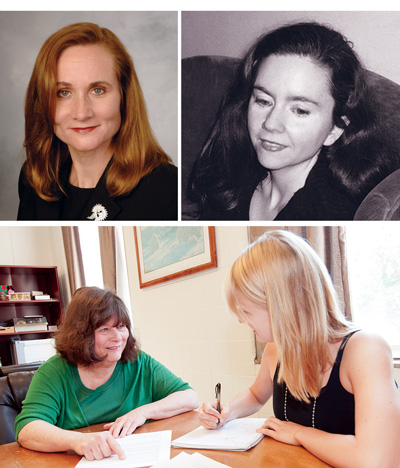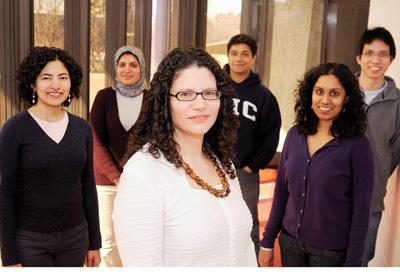Helping graduate students along the path to success
Graduate Mentoring Awards are designed to encourage and award excellence and innovation in all aspects of graduate mentoring. Every year, the Graduate College provides up to four awards of $2,000 each.
Tanya Berger-Wolf, computer science
What’s the most effective way mentors can help graduate students? Give them the skills for success, says Tanya Berger-Wolf.
“I make sure they have the right tools, confidence and independence to pursue their passion,” says Berger-Wolf, associate professor of computer science.
“I see graduate students as my junior colleagues, so I explicitly think of what it would take to get them there.”
This isn’t the first time Berger-Wolf has been recognized for her emphasis on mentoring. In 2009, she received a UIC Mentor of the Year Award from the Chancellor’s Committee on the Status of Women.
Berger-Wolf supervises five doctoral students, two graduate students and several undergraduates in her computational population biology lab. Their projects range from designing computational methods for analyzing social networks to tracking zebras to study animal social behaviors.
“The students are in graduate school because they are passionate about research, but it’s also to see whether their passion is enough to make research a part of their life,” says Berger-Wolf, a UIC faculty member for seven years.
To finish a doctoral program, it takes more than just intelligence, she adds.
“It takes passion, drive, motivation and pure tenacity,” she says. “They need the ability to go in a new direction when 99 of them have failed.
“It has to come within — not from the adviser. Once that exists within the student, I can work with them.”
She encourages female graduate students in particular to realize their potential.
“It doesn’t matter how gender-blind I want to be, there is still the added responsibility of being a role model and ensuring that women who want to become scientists have that opportunity and have the right tools to succeed,” she says.
Bette Bottoms, psychology
Being “good enough” is not good enough, says Bette Bottoms, psychology professor, dean of the Honors College and vice provost for undergraduate affairs.
“Students must be excellent,” says Bottoms.
Being “excellent” isn’t easy — it takes a lot of effort and long hours, she says. Having a good mentor helps.
“My mentorship style is a careful balance between hands-on and hands-off training,” she says.
“Very specific constructive criticism and correction is balanced by warm, steady encouragement that nurtures the spirit of confidence that moves graduate students from doing what they are told to being independent leaders in scholarship.”
Bottoms helps her students build a strong résumé, requiring them to work on several collaborative and independent research projects simultaneously.
She thinks of her teaching assistants as co-teachers to help them practice their instructional and mentoring skills.
“An important aspect of graduate preparation is helping students become teachers and mentors themselves,” she says. “I teach my graduate students that every day as a teacher brings them the opportunity to be the one who makes a difference in a student’s life.”
Over the course of her 20 years at UIC, Bottoms says, her greatest reward has been watching her students’ successes.
“Even the smallest things we do can have great consequences in the life of a graduate student, consequences we are lucky to see occasionally,” she says. “I’ve been lucky enough to see them often.”
Christina Pugh, English
For doctoral students in English, it’s crucial to be a creative writer who’s also a literary intellectual, says Christina Pugh.
“The literary quality of what the students produce is very important,” says Pugh, associate professor of English and director of undergraduate studies in the department.
Each year, Pugh mentors more than 10 doctoral students working on creative writing dissertations. She connects with many of her students through the graduate poetry workshop and literature seminars she teaches.
Pugh guides her graduate students as they tackle the challenge of writing a collection of poems that ultimately could become a publishable book.
“A lot of it is pointing them in the direction of good poets to read,” says Pugh, who joined UIC in 2005.
“Being a poet, I understand the process that they’re going through. I can talk to them and be a help if they’re struggling.”
It’s important for mentors to dedicate time to their graduate students, Pugh says.
“It’s not easy or something you can breeze through. It takes a certain commitment,” she says.
“It’s important to have conversations with students, be open to what they have to say and have a strong working relationship.”
Graduate students must have the determination to keep going despite the challenges, she adds.
“It takes determination, the ability to be proactive about moving forward with your goals and having the desire to get through,” she says.
“They must have the willingness to really think about what their professors are suggesting and move forward with that.”
Lauretta Quinn, biobehavioral health science
For Lauretta Quinn, the most effective way to mentor graduate students, helping them navigate from basic coursework to dissertation, is frequent, face-to-face contact.
“If you don’t do that, you lose them,” says Quinn, clinical associate professor of biobehavioral health science.
Quinn’s graduate students often start out analyzing data from her studies on Types 1 and 2 diabetes, then design their own research projects based on that data.
It’s important for graduate students to feel connected to their research, Quinn says. So each summer, she takes several doctoral students along to work at Triangle D, a summer camp in the northern suburbs for children with diabetes.
Quinn and her students spend a week with the 9- to 13-year-olds, helping them manage their insulin and maintain a healthy diet.
“It’s one of my greatest mentoring experiences,” says Quinn, who joined UIC in 1996.
“Sometimes we’re up there for 16 hours a day, working really closely with the kids. It helps the students understand the people they are going to help.”
Being a graduate student is time consuming, so it’s crucial to find the right balance between studies, personal life and, for some, a job.
“It’s best to do it when you can concentrate and not extend it over a long period of time — and know that you’re not going to be really rich when you’re doing it,” she says.
Quinn knows what it takes to be a successful graduate student at UIC — she received her doctoral degree here.
“You have to be intellectually curious and open to a lot of ideas,” she says.


